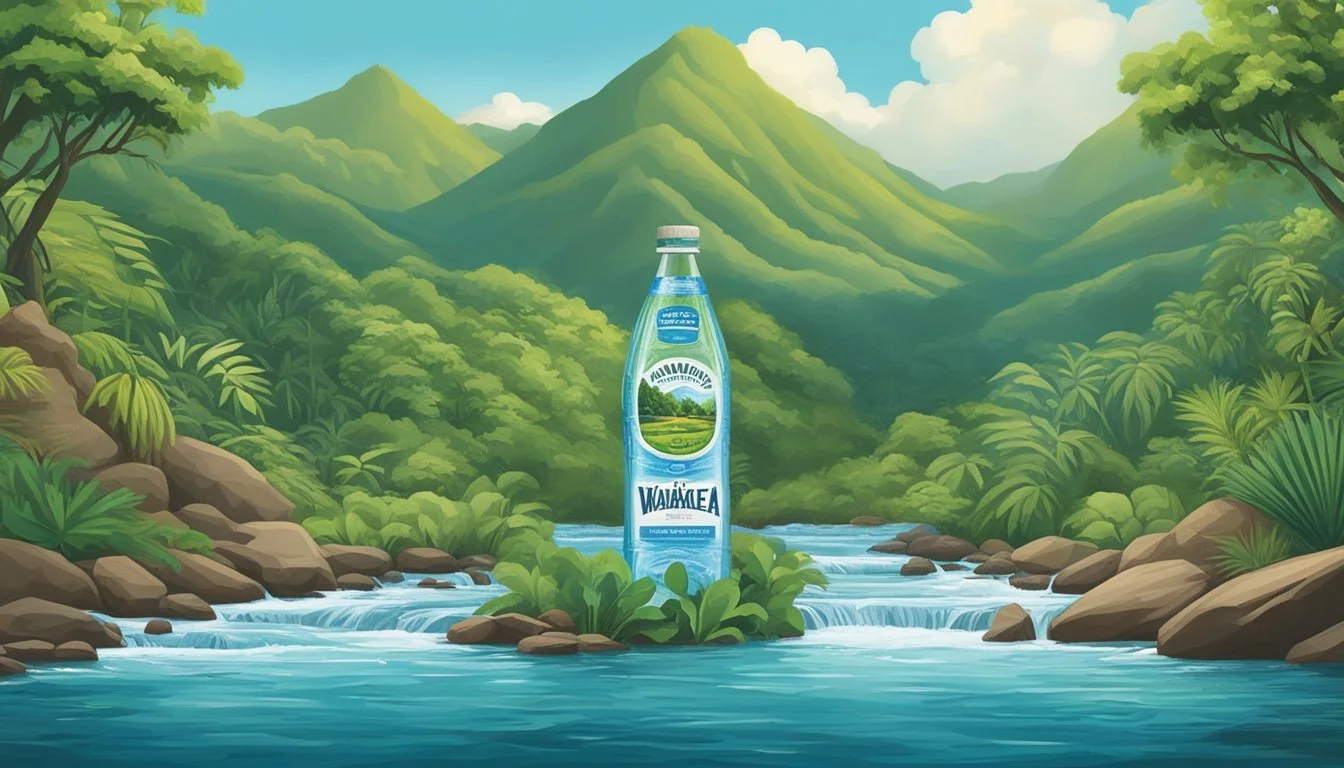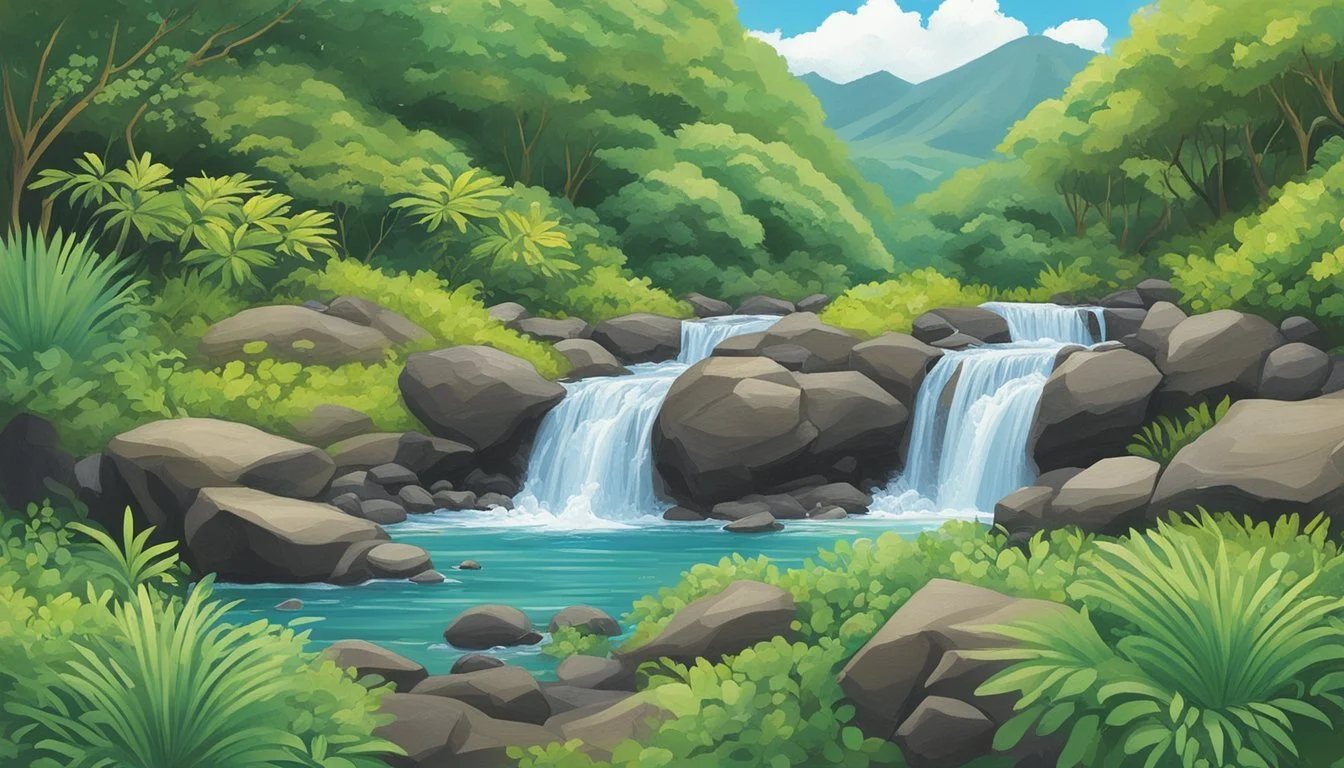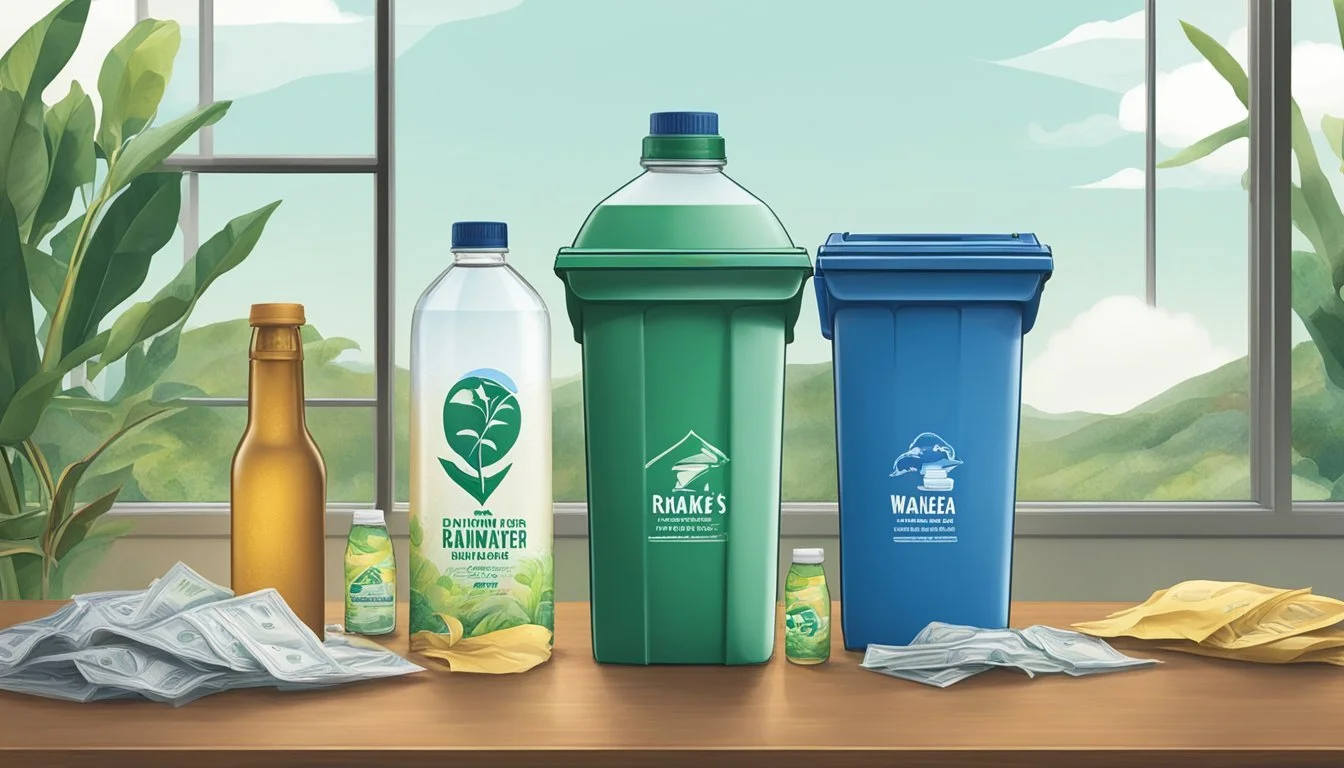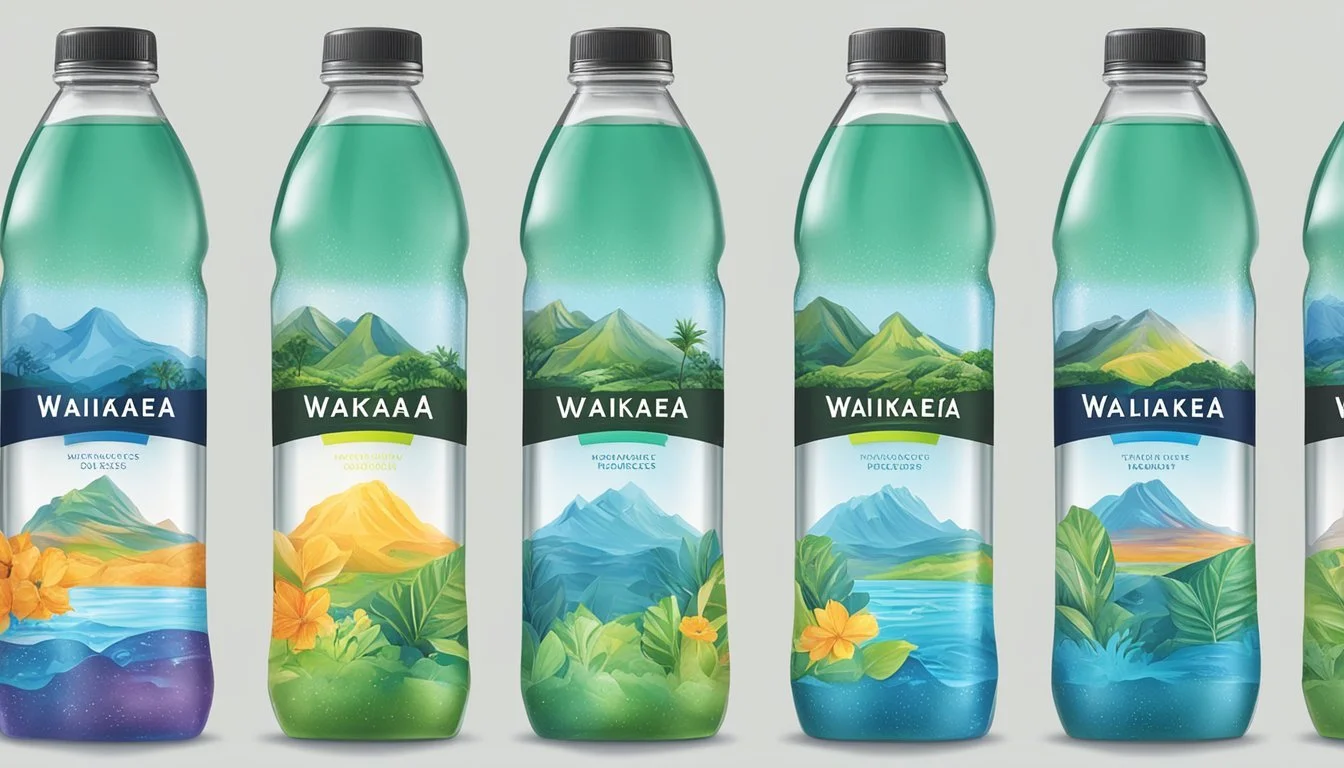Waiakea vs. Richard’s Rainwater
A Comprehensive Comparison of Bottled Water Quality
Choosing the right bottled water can be a bit overwhelming with numerous brands on the market, each touting unique benefits. This blog post intends to compare Waiakea and Richard’s Rainwater to determine which might be a better option for consumers. Waiakea water is known for its naturally high alkaline pH of 8.8, which helps to neutralize acidity in the body and supports critical functions.
Richard’s Rainwater, on the other hand, offers a completely different approach. Collected from rain and purified, it emphasizes sustainability and a minimal environmental footprint. It’s bottled without the heavy processes that many other water brands undergo, appealing to eco-conscious consumers looking to reduce their carbon footprint.
Both brands bring something unique to the table, whether it's Waiakea’s volcanic filtration process or Richard’s Rainwater’s sustainable harvesting. This comparison will delve deeper into the health benefits, taste profiles, and environmental impacts to help you decide which bottled water better aligns with your needs and values.
Bottled Water Industry Overview
Bottled water has become a staple in many households and a significant player in the beverage industry. Its importance, evolving consumer preferences, and regulatory standards shape the market's landscape.
Importance of Bottled Water
Drinking water is essential for health, and bottled water provides a convenient solution. It ensures access to clean and safe water, especially in areas where tap water may be compromised. For retailers, bottled water remains a high-demand product driving substantial sales.
Health-conscious consumers often opt for bottled water over sugary beverages. Brands emphasize purity, mineral content, and environmental responsibility. Waiakea, for example, markets its water as highly alkaline and rich in beneficial minerals.
Trends in Consumer Preferences
Consumers are increasingly discerning about their bottled water choices. There's a rising demand for products that offer more than just hydration. Features like alkaline pH, mineral content, and sustainable packaging are crucial.
Many companies now use recycled plastics (RPET) and biodegradable materials. This shift aligns with growing environmental consciousness among consumers. Brands like Richard’s Rainwater highlight their pure, minimally processed water to attract health-focused individuals.
Sales data reflect these trends, with premium and eco-friendly bottled water brands experiencing growth. Retailers stock a variety of options to cater to diverse preferences, from purified water to alkaline and mineral-rich varieties.
Regulation and Standards
The bottled water industry is subject to stringent regulation and standards to ensure safety and quality. Agencies like the FDA in the United States set strict guidelines for bottled water production, labelling, and sales.
Standards cover aspects such as source water protection, bottling processes, and contaminant levels. Compliance with these regulations is crucial for maintaining consumer trust and ensuring public health.
In addition to federal standards, industry organizations may set their own benchmarks. Certifications from bodies like the International Bottled Water Association (IBWA) indicate adherence to higher quality and safety standards. This regulatory framework helps protect consumers and supports the industry's integrity.
Source and Origin of the Water
Understanding the origins of Waiakea and Richard’s Rainwater helps to appreciate their unique characteristics and potential benefits. Each brand source their water differently, which impacts its composition and purity.
Waiakea Hawaiian Volcanic Water
Waiakea Water is sourced from a deep well located in Hilo, on the Big Island of Hawaii. Its water originates from the eastern base of Mauna Loa volcano, surrounded by rich, biodiverse forest preserves. The area is known for its extremely pure environment, contributing to the overall quality of the water.
The water is naturally alkaline and enriched with minerals due to the volcanic rock filtration process. Waiakea does not claim to bottle spring water; instead, it emphasizes volcanic filtration and the natural mineral content derived from the volcanic soil.
Richard’s Rainwater Collection
Richard’s Rainwater is harvested from rainfall, collected, and retained before reaching the ground. The collection sites include facilities in New Orleans and other locations known for their frequent rainfall. This method allows the water to remain free of contaminants typically found in groundwater or municipal sources.
The collection process focuses on sustainability, capturing precipitation before it mixes with any surface contaminants. After collection, the water undergoes a purification process to ensure its safety and quality. This rainwater harvesting results in a unique, naturally soft taste and distinguishes Richard’s Rainwater as a sustainable option in bottled water.
Collection and Filtration Processes
The collection and filtration processes of Waiakea and Richard’s Rainwater highlight their commitment to delivering clean, high-quality water. Each brand employs distinct methods focusing on the origin and treatment of their water.
Natural vs. Engineered Filtration
Waiakea sources its water from snowmelt and rain that filter through 14,000 feet of volcanic rock. This natural filtration system enhances water quality by imparting minerals like silica, which may support bone, hair, skin, and nail health. The naturally alkaline water boasts a balanced mineral profile due to this extensive filtration.
Richard’s Rainwater collects rainwater directly, ensuring it is 100% potable and free from contaminants. Their process emphasizes capturing pure water from the start, thus minimizing the need for intensive engineered filtration systems. This approach promises a crisp and clean taste, reflecting the purity of rainwater.
Purification Techniques
Waiakea uses minimal post-collection purification because of its rigorous natural filtration through volcanic rock. The processes primarily aim to maintain water's natural properties while ensuring it meets safety standards.
Richard’s Rainwater prioritizes purity from the point of collection. The captured rainwater undergoes a thorough purification process, including multi-stage filtration and UV light disinfection. These techniques ensure that any potential contaminants are eliminated, guaranteeing the water remains pure and safe to drink.
Quality Control Measures
Waiakea implements comprehensive quality control measures to ensure each bottle of water maintains the brand’s high standards. Regular testing for contaminants and consistent monitoring of mineral content are part of their routine. These measures affirm that the water retains its natural quality and safety.
Richard’s Rainwater also adheres to strict quality control processes. Each batch of collected rainwater is subject to rigorous testing and monitoring. The brand ensures that the water’s cleanliness and purity are uncompromised from collection to bottling. Stringent standards are maintained to guarantee the water's safety and quality for consumers.
With these distinct approaches, both brands highlight the importance of clean and high-quality water through their dedicated collection and filtration processes.
Packaging and Environmental Impact
Waiakea and Richard’s Rainwater both prioritize sustainability in their packaging and aim to minimize their environmental footprint. This section will explore the packaging materials they use and their carbon footprint.
Sustainable Packaging Options
Waiakea uses recyclable plastic bottles made from 100% recycled polyethylene terephthalate (rPET), reducing the need for new plastic production. The brand also emphasizes biodegradable bottles, aiming to lessen landfill waste. Richard's Rainwater opts for aluminum cans and recyclable glass bottles, which are more environmentally friendly than traditional plastic. Their glass bottles are reusable and can be easily recycled, supporting a circular economy.
Both companies strive for packaging that minimizes environmental impact. Waiakea’s focus on recycled materials and biodegradable options shows a commitment to reducing plastic waste. Richard’s Rainwater’s choice of aluminum and glass promotes sustainability through high recyclability and reuse potential.
Carbon Footprint and Ecosystem Health
Waiakea is the first U.S. bottled water brand to be certified Carbon Neutral. They achieve this by using low-impact production processes and investing in reforestation projects. Their operations emphasize local sourcing to reduce transportation emissions, contributing positively to ecosystem health.
Richard’s Rainwater collects rainwater, a naturally renewing resource, reducing the strain on groundwater and municipal water supplies. Their production involves fewer energy-intensive processes, lowering their overall carbon footprint. By capturing and purifying rainwater, they also avoid the ecological impacts of large-scale water extraction.
Both brands incorporate eco-friendly practices into their production. Waiakea’s carbon neutrality and local sourcing efforts align with resource conservation. Richard’s Rainwater’s use of rainwater contributes significantly to ecosystem sustainability and reduced emissions.
Product Offerings and Varieties
Waiakea and Richard's Rainwater both offer a range of bottled water products, focusing on different consumer preferences and sustainability practices. Each brand presents distinct options in both still and sparkling water categories.
Still vs. Sparkling Water Choices
Waiakea sources its water from snowmelt and rain filtered through volcanic rock, which gives it a unique mineral composition. The brand offers still water in bottles made from sustainable sources. Additionally, Waiakea's water boasts a naturally alkaline pH, enhancing its taste profile.
Richard's Rainwater focuses on bottled rainwater, with both still and sparkling varieties available. Collected rainwater is treated to ensure it is 100% potable and free from contaminants. Their sparkling rainwater, offered in aluminum cans, features fine bubbles and a refreshing taste, making it an eco-friendly choice for consumers.
Taste Profile and Mineral Content Analysis
Waiakea and Richard’s Rainwater present distinct taste profiles rooted in their unique origins and mineral compositions. These differences impact their suitability for varying consumer preferences.
Water Flavor Factors
Waiakea water boasts a smooth and crisp taste. Its journey through volcanic rock enriches it with minerals like silica, calcium, and magnesium. This natural filtration contributes to a naturally alkaline pH of 7.6 to 8.2, enhancing its refreshing profile without the need for chlorine or fluoride additives.
Richard’s Rainwater stands out for its pure and clean taste, achieved by filtering rainwater directly as it falls. This process results in water that is free from contaminants and additives. Consumers often describe it as having a very neutral and crisp flavor, with minimal mineral presence, ideal for those seeking pure hydration without metallic or mineral aftertastes.
These differences in flavor and mineral content make each brand uniquely appealing depending on individual tastes and needs.
Distribution, Accessibility, and Retailers
Each brand's market reach and price points play critical roles in consumer choice, with Waiakea and Richard’s Rainwater differing significantly in these aspects.
Availability Across Markets
Waiakea can be found in many major retailers such as Whole Foods, Kroger, and Albertsons. Its distribution network covers a wide range of markets, making it accessible to a large demographic. Waiakea benefits from a robust supply chain, ensuring that consumers can easily purchase it in both urban and suburban areas.
Richard’s Rainwater, although pioneering in its approach, has a more niche market presence. It is primarily available in select eco-focused stores and some independent retailers. This means it might be harder to find for some consumers, particularly those not living near specialized health and wellness outlets. Its expanding distribution network aims to improve this, focusing on regions with a high demand for sustainable products.
Prices and Affordability
Waiakea generally offers competitive pricing for a premium bottled water brand. Prices vary by retailer, but on average, a liter bottle can range between $2.00 and $2.50. Bulk purchasing options and occasional promotions at stores like Albertsons and Kroger can further enhance affordability.
Richard’s Rainwater tends to be priced slightly higher due to its unique sourcing and limited distribution. A liter bottle often costs around $2.50 to $3.00. This price point reflects its specialized collection process and commitment to sustainability. While it may be considered a luxury purchase by some, the brand aims to offer value through its environmental benefits and purity.
Brand Ethos and Sustainability Commitments
Both Waiakea and Richard's Rainwater prioritize sustainability and environmental impact, with unique approaches that differentiate them in the market.
Richard Heinichen and His Vision
Richard Heinichen, the founder of Richard's Rainwater, envisioned a bottled water brand rooted in sustainability. His mission highlights harvesting rainwater, which minimizes the need for ground water sources and reduces the environmental footprint.
A key aspect of Heinichen's approach emphasizes renewability. By relying solely on rainwater, the brand avoids using municipal or natural underground sources. This method not only conserves resources but also ensures a sustainable cycle of water management.
His commitment extends to eco-friendly bottling practices. Using mainly eco-friendly materials, Heinichen aims to mitigate climate change impacts. The vision of being both sustainable and renewable underscores every aspect of Richard's Rainwater.
Waiakea’s Social Responsibility
Waiakea's ethos revolves around social and environmental responsibility. They source their water from Hawaiian volcanoes, utilizing natural processes that filter and purify the water. Sourcing their water from a renewable resource like volcanic filtration aligns with their commitment to sustainability.
Waiakea also engages in various partnerships with environmental and social nonprofits. Over 5% of their revenue supports causes in Hawaii and beyond, reflecting their dedication to sustainability not just environmentally but socially.
Their focus on social responsibility extends to their operational processes. Waiakea’s use of post-consumer recycled PET (rPET) bottles significantly reduces their carbon footprint, energy consumption, and water usage, demonstrating a clear commitment to eco-friendly practices.
Eco-Friendly and Renewable Practices
Richard's Rainwater and Waiakea both emphasize eco-friendly and renewable practices in their operations. Richard's Rainwater collects and purifies rainwater, an inherently renewable resource, minimizing environmental impact. Their bottling processes focus on sustainability, often utilizing materials that reduce waste.
Waiakea, on the other hand, focuses on advanced sustainable practices, including the use of 100% high-grade rPET. These bottles are not only recyclable but also drastically cut down on the energy and water footprint compared to traditional plastic bottles.
Furthermore, Waiakea’s operational processes are structured to achieve Carbon Neutral certification. They demonstrate an ongoing commitment to reducing carbon emissions in every step of production.
Both brands illustrate that choosing bottled water doesn't have to compromise environmental responsibility, setting benchmarks within the industry through robust and innovative sustainable practices.
Consumer Perspectives and Personal Preference
Individual tastes and values deeply influence the preference for either Waiakea or Richard’s Rainwater. Testimonials and consumer reviews offer insight into what draws people to one brand over the other, while personal priorities guide the final choice.
Testimonials and Reviews
Consumer testimonials often highlight Waiakea's unique volcanic filtration process, which is said to provide a distinctive taste. Many consumers appreciate the brand's focus on sustainability and alkaline water, believing these features contribute to their overall hydration.
In contrast, Richard’s Rainwater has received praise for its purity and eco-friendly approach. Customers who prioritize environmental values often commend its rainwater harvesting process. Reviews frequently mention the refreshing taste and the company’s charitable water donation efforts.
Both brands receive positive feedback for their commitment to quality and sustainability, reflecting the growing consumer demand for health-conscious and environmentally-friendly products.
Choosing the Right Bottled Water for You
Selecting the best bottled water involves considering what aspects are most important to you. If you prioritize a unique, mineral-rich hydration experience, Waiakea may appeal due to its volcanic origin and alkaline properties. Their commitment to sustainability might also be a key factor.
Richard’s Rainwater caters to those who value purity and an eco-conscious approach. Knowing the water is collected directly from rain could resonate with consumers who place environmental impact at the forefront of their choices.
Ultimately, the choice between Waiakea and Richard’s Rainwater often comes down to individual preferences in taste, values, and desired benefits.
More About Waiakea
Icelandic Glacial vs Waiakea: Which Bottled Water is Better?
Mountain Valley Spring Water vs Waiakea: Which Bottled Water is Better?
Waiakea vs Kirkland Signature: Which Bottled Water is Better?
Waiakea vs Whole Foods Italian Still Mineral water: Which Bottled Water is Better?
More About Richard’s Rainwater
Acqua Pana vs Richard's Rainwater: Which Bottled Water is Better?
Alkaline88 vs Richard's Rainwater: Which Bottled Water is Better?
Antipodes vs Richard's Rainwater: Which Bottled Water is Better?
Aqua Carpatica vs Richard's Rainwater: Which Bottled Water is Better?
Aquafina vs Richard's Rainwater: Which Bottled Water is Better?
Arrowhead vs Richard's Rainwater: Which Bottled Water is Better?
Boxed Water vs Richard's Rainwater: Which Bottled Water is Better?
Cascade Mountain vs Richard's Rainwater: Which Bottled Water is Better?
Castle Rock vs Richard's Rainwater: Which Bottled Water is Better?
Cirro vs Richard's Rainwater: Which Bottled Water is Better?
Core Hydration vs Richard's Rainwater: Which Bottled Water is Better?
Crystal Geyser vs Richard's Rainwater: Which Bottled Water is Better?
Deer Park vs Richard's Rainwater: Which Bottled Water is Better?
Erewhon vs Richard's Rainwater: Which Bottled Water is Better?
Essentia vs Richard's Rainwater: Which Bottled Water is Better?
Eternal vs Richard's Rainwater: Which Bottled Water is Better?
Ethos vs Richard's Rainwater: Which Bottled Water is Better?
Evian vs Richard's Rainwater: Which Bottled Water is Better?
Hawaii Volcanic vs Richard's Rainwater: Which Bottled Water is Better?
Hawaiian Springs vs Richard's Rainwater: Which Bottled Water is Better?
Ice Mountain vs Richard's Rainwater: Which Bottled Water is Better?
Icelandic Glacial vs Richard's Rainwater: Which Bottled Water is Better?
Just Water vs Richard's Rainwater: Which Bottled Water is Better?
Kroger vs Richard's Rainwater: Which Bottled Water is Better?
LIFEWTR vs Richard's Rainwater: Which Bottled Water is Better?
Liquid Death vs Richard's Rainwater: Which Bottled Water is Better?
Mananalu vs Richard's Rainwater: Which Bottled Water is Better?
Mountain Valley Spring Water vs Richard's Rainwater: Which Bottled Water is Better?
Nestle Pure Life vs Richard's Rainwater: Which Bottled Water is Better?
Origin vs Richard's Rainwater: Which Bottled Water is Better?
Ozarka vs Richard's Rainwater: Which Bottled Water is Better?
Penta vs Richard's Rainwater: Which Bottled Water is Better?
Perrier vs Richard's Rainwater: Which Bottled Water is Better?
Poland Spring vs Richard's Rainwater: Which Bottled Water is Better?
Purely Sedona vs Richard's Rainwater: Which Bottled Water is Better?
Richard's Rainwater vs 1907water: Which Bottled Water is Better?
Richard's Rainwater vs 7-Select: Which Bottled Water is Better?
Richard's Rainwater vs Action: Which Bottled Water is Better?
Richard's Rainwater vs Big Chill: Which Bottled Water is Better?
Richard's Rainwater vs Big Win: Which Bottled Water is Better?
Richard's Rainwater vs BodyArmor: Which Bottled Water is Better?
Richard's Rainwater vs CBD Living: Which Bottled Water is Better?
Richard's Rainwater vs Crystal Lake: Which Bottled Water is Better?
Richard's Rainwater vs Dasani: Which Bottled Water is Better?
Richard's Rainwater vs Essence pH10: Which Bottled Water is Better?
Richard's Rainwater vs HFactor: Which Bottled Water is Better?
Richard's Rainwater vs Kirkland Signature: Which Bottled Water is Better?
Richard's Rainwater vs Open Water: Which Bottled Water is Better?
Richard's Rainwater vs Ophora: Which Bottled Water is Better?
Richard's Rainwater vs Proud Source: Which Bottled Water is Better?
Richard's Rainwater vs Pure Life: Which Bottled Water is Better?
Richard's Rainwater vs Ramona: Which Bottled Water is Better?
Richard's Rainwater vs Refreshe: Which Bottled Water is Better?
Richard's Rainwater vs Simple Truth: Which Bottled Water is Better?
Richard's Rainwater vs Skyra: Which Bottled Water is Better?
Richard's Rainwater vs Talking Rain AQA: Which Bottled Water is Better?
Richard's Rainwater vs The Well: Which Bottled Water is Better?
Richard's Rainwater vs Weird Water: Which Bottled Water is Better?
Richard's Rainwater vs Whole Foods 365: Which Bottled Water is Better?
Richard's Rainwater vs Zenwtr: Which Bottled Water is Better?
San Pellegrino vs Richard's Rainwater: Which Bottled Water is Better?
Smartwater vs Richard's Rainwater: Which Bottled Water is Better?
Solan de Cabras vs Richard's Rainwater: Which Bottled Water is Better?
Starkey vs Richard's Rainwater: Which Bottled Water is Better?
Tahoe vs Richard's Rainwater: Which Bottled Water is Better?
Topo Chico vs Richard's Rainwater: Which Bottled Water is Better?
Tru Alka vs Richard's Rainwater: Which Bottled Water is Better?
Volvic vs Richard's Rainwater: Which Bottled Water is Better?
Whole Foods Italian Still Mineral water vs Richard's Rainwater: Which Bottled Water is Better?
Zephyrhills vs Richard's Rainwater: Which Bottled Water is Better?








